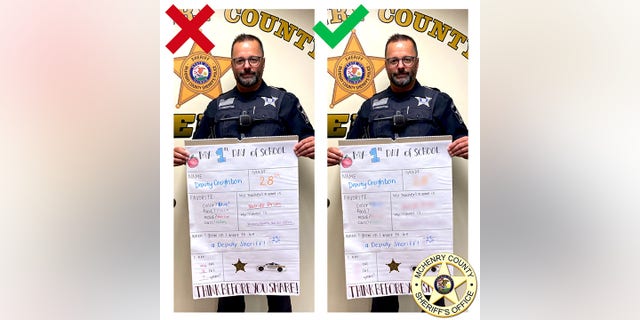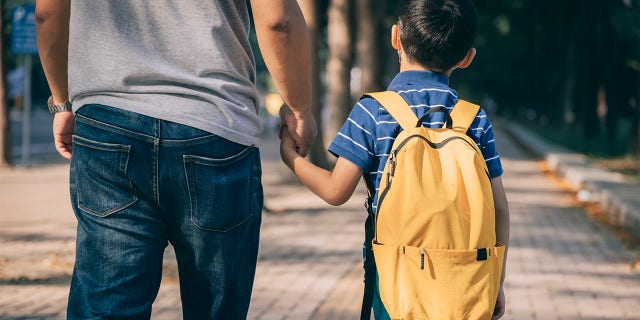With back-to-school in full swing, safety experts and law enforcement are urging parents to be mindful of what they share in regards to a popular social media photo trend with kids – as it could make them easy targets for predators.
On Aug. 8, the McHenry County Sheriff’s Office in Woodstock, Illinois, shared an image of Deputy Sherriff Tim Creighton exemplifying a common online theme in which parents post images of their children posing with a sign to celebrate the first day of a new school year.
(McHenry County Sheriff’s Office)
The two-snapshot Facebook post shows Creighton holding a poster titled, “My first day of school” with the left side sharing mock information such as name, age, grade, teacher and name of school in attendance. The right image has those personal details blurred out, suggesting that it’s unsafe to include it in a picture.
The post was shared upwards of 69,000 times, with many commenters thanking the sheriff’s office for the crucial tip that parents should never share the following:
School name
Age
Teacher’s name and grade
Identifying features (height, weight, etc.)
Overly personal information (think items related to passwords or security question answers, etc.)
“This information…can all be used by predators, scammers, and other people looking to endanger your child, family, or finances,” the caption read. “No matter your privacy settings or friends list, its best to keep personal information on the internet to the bare minimum.”
Creighton said the images were publicly posted as a reminder to parents and caregivers: “Think before you share.”
“Cyber security, internet passwords fraud, sex trafficking…there’s a lot,” Creighton told Fox News of the reasons why certain details should be omitted.
Creighton added that oftentimes people will use their child’s name in passwords, therefore identity theft can occur if too much is given away online.
“It protects the child but we also did it for the parents,” he added. “A lot of people were commenting [how] they never, ever thought about it…it was an important safety message created in an engaging way.”
Donna Rice Hughes is the president & CEO of Enough Is Enough, a non-profit organization seeking to maximize internet safety for kids, and prevent online exploitation.
Hughes, who is also an internet safety expert, echoed Creighton as she warned families against sharing identifiable information – “even if their social media accounts are set to private,” she said.
“Anyone in your friends’ circle can then share that information,” Hughes told Fox News.
Little boy dressed for his first day back to school, having his photo taken by his Mother on her smartphone.
(iStock)
“Parents and grandparents are proud and excited and exuberant and are their kids and grandkids best cheerleaders. Sometimes they can, in that exuberance, share too much information online,” she said, adding that parents should “not think as parents, but as predators.”
“[Think], ‘how would a dangerous predator be able to use this information to gain access to my child or my grandchild?’”
Hughes also advised against backpacks that have a child’s name printed on the back, in which case a predator will then be able to address them directly and use it as a tool to make contact.
Hughes agreed – a child’s guard can drop if a person knows their name, and they could easily forget they’re wearing a personalized backpack as they’re approached.
“Predators prey where kids play,” Hughes said. “They work offline and online. You don’t want to give predators an entry point to your child.”
Father and son going to kindergarten
(iStock)
Hughes said all predators may need are the name, school and photo revealing what a child looks like, in order to locate that child.
She offered tips on how to keep kids safe on, and offline.
Role play with kids.
Instead of listing do’s and don’ts, give an example. Ask your child, “What would be the safest way to respond to this situation? And, “What would you do?”
The less information, the better.
Teach kids to have this same mindset – especially if it’s shared online.
Monitor all internet use.
Ask questions like, “Did you post anything today? Can I see?” Use filters, and watch the conversations kids are having. Do your best.
Explain how strangers can be online, too.
Ask, “How do you know them? Do you know him through school?” Explain in detail how people may not be who they say they are.
Start these conversations young.
Make them aware that there are dangerous people do exist. Help them build those critical thinking skills.
Ensure that they can come to you.
Teach kids that whatever happens, even if they feel bad about it, they won’t be in trouble for confiding in you.
Know that no child is immune from online exploitation.
Kids are innocent, vulnerable and curious. Predators know more than anyone on how to exploit that, Hughes said.
Check all your child’s devices before heading #BackToSchool. Make sure they are updated and secure! For more help, https://t.co/M59MQSLPMA pic.twitter.com/zgG61OFrx6
— Enough Is Enough (@EIETweets) August 28, 2021
Hughes said parents can still of course share back-to-school moments while keeping unnecessary details private.
Deputy Creighton, who is also the school resource officer in his area, said he too encourages parents to be communicative with their children about their online presence and monitor social media use. He suggested apps for computers and smartphones to help do this.
For more tips, visit Enough Is Enough’s Internet Safety 101.
 Iktodaypk Latest international news, sport and comment
Iktodaypk Latest international news, sport and comment







